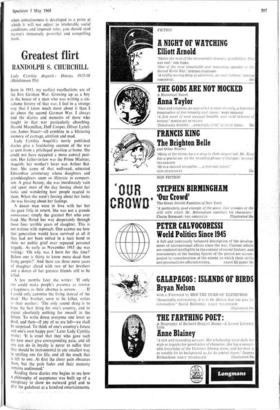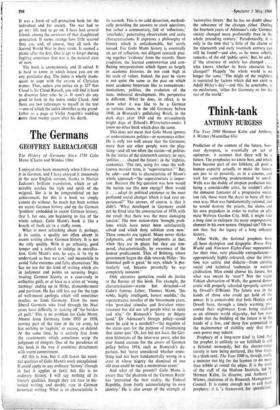Lady Cynthia Asquith : Diaries 1915-18 (Hutchinson 55s)
Greatest flirt
RANDOLPH S. CHURCHILL
Lady Cynthia Asquith : Diaries 1915-18 (Hutchinson 55s) Born in 1911, my earliest recollections are of the first German War. Growing up as a boy in the house of a man who was writing a six- volume history of that war, I feel in a strange way that I know much more about it than I do about the second German War. I always find the diaries and memoirs of those who fought in that war particularly absorbing. Harold Macmillan, Duff Cooper, Oliver Lyttel- ton, James Stuart—all combine in a blistering memory of carnage, attrition and mud.
Lady Cynthia Asquith's newly published diaries give a' fascinating account of the war as seen from a privileged position at home. She could not have occupied a more central posi- tion. Her father-in-law was the Prime Minister, Asquith; her mother's lover was Arthur Bal- four. She came of that well-read, educated Edwardian aristocracy whose daughters and granddaughters seem so illiterate in compari- son. A great beauty, she was inordinately vain and spent most of the day fussing about her looks and wondering how people reacted to them. When she wasn't fussing about her looks she was fussing about.her feelings.
A dozen men were in love with her- but she gave little in return. She was not a grande amout ease; simply the greatest flirt who ever lived. She flirted her way desperately through those four terrible years of slaughter. This is not written with reproach. One cannot see how that generation would have survived at all if they had not been united in a tacit bond to show no public grief over repeated personal tragedy. As early as November 1915 she was writing: 'Oh why was I born for this time? Before one is thirty to know more dead than living people?' And there are three more years of slaughter ahead with two of her brothers and a dozen of her greatest friends still to be killed.
A few months later she writes: 'If only one could make people's presence as intense a happiness as their absence is sorrow. . . . If I could only canonise the living instead of the dead.' Her brother, soon to be killed, writes to their mother: 'The only sound thing is to hope the best thing for one's country, and to expect absolutely nothing for oneself in the future. To write down everyone one loves as dead, and then—if any of us are left—we shall be surprised. To think of one's country's future and one's own happy past.' Later Lady Cynthia wrote: 'It is cruel that they who gave such joy now must give corresponding pain, and all one can do in loyalty is never to suffer that they should be instrumental in any smallest way in spoiling one for life, and all the much that is left to one. At first the sheer pain obscures them, but the pain fades and their memory remains undimmed.'
Reading these diaries one begins to see how a philosophy of acceptance was built up of a conspiracy to show no outward grief and to play the, gadabout at a hundred entertainments. It was a form of self-protection both for the individual and for society. The war had to go on : life had to go on. I have had several friends among the survivors of that slaughtered generation. It seems strange how little scarred they are, and, of course, they all took the Second World War in their stride. It seemed a picnic after the first. One is apt to forget during fugitive armistices that war is the natural state of man.
The book is anonymously and ill edited. It is hard to know in which house you are on any particular day. The index is wholly inade- quate to cope with the swarm of Christian names. Thus, unless you notice on p. 227 that Claud is Sir Claud Russell, you will find it hard to discover later who he is. It won't do any good to look in the index under Claud. And there are two references to myself in the text —one of which the index identifies as my grand- father as a page at Violet Asquith's wedding more than twenty years after his death.







































 Previous page
Previous page